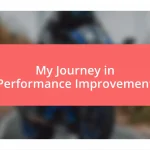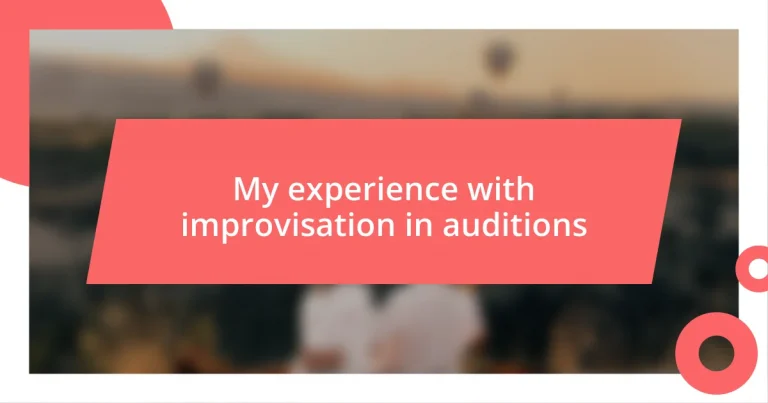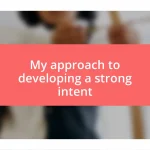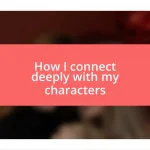Key takeaways:
- Improvisation in auditions showcases an actor’s creativity and adaptability, essential for navigating unexpected challenges confidently.
- Techniques like “Yes, and…”, visualization, and mindfulness enhance improvisational skills, fostering authentic and engaging performances.
- Transforming nervous energy into excitement, grounding oneself in the moment, and self-affirmation boost confidence and reduce anxiety during auditions.
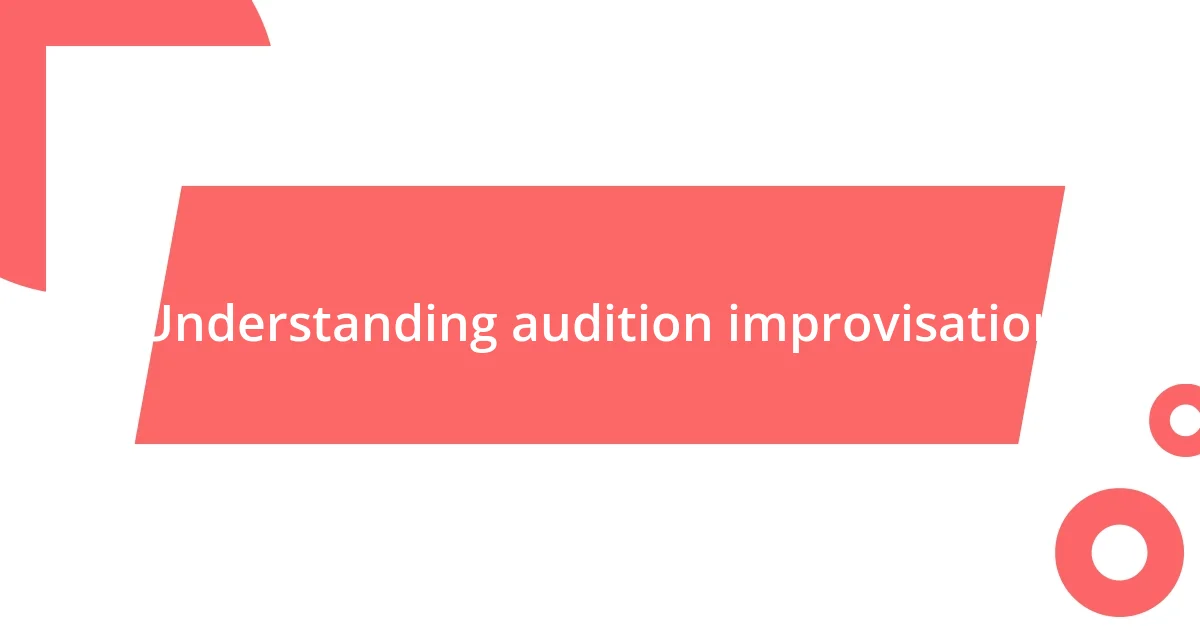
Understanding audition improvisation
When I first encountered audition improvisation, I was both excited and terrified. It’s like stepping onto a tightrope with no safety net; the thrill of creating something spontaneous can be exhilarating. How do you tap into that moment of inspiration when the pressure is on?
In an audition setting, improvisation is all about showcasing your ability to think quickly and adapt to unexpected situations. I vividly remember a time when the casting director threw a curveball by changing a character’s motivation right in the middle of the scene. Instead of panicking, I leaned into my instincts, and it transformed the whole moment. That experience taught me that improvisation isn’t just about being funny or wacky, it’s about being present and genuinely connecting with the material and the audience.
It’s essential to remember that improvisation also requires a solid foundation of character understanding and scene analysis. I learned that the more deeply I knew my character, the easier it became to pivot in unexpected directions. Have you ever found yourself in a situation where you had to adjust on the fly? I believe those moments can reveal the true depth of our talent and resilience.
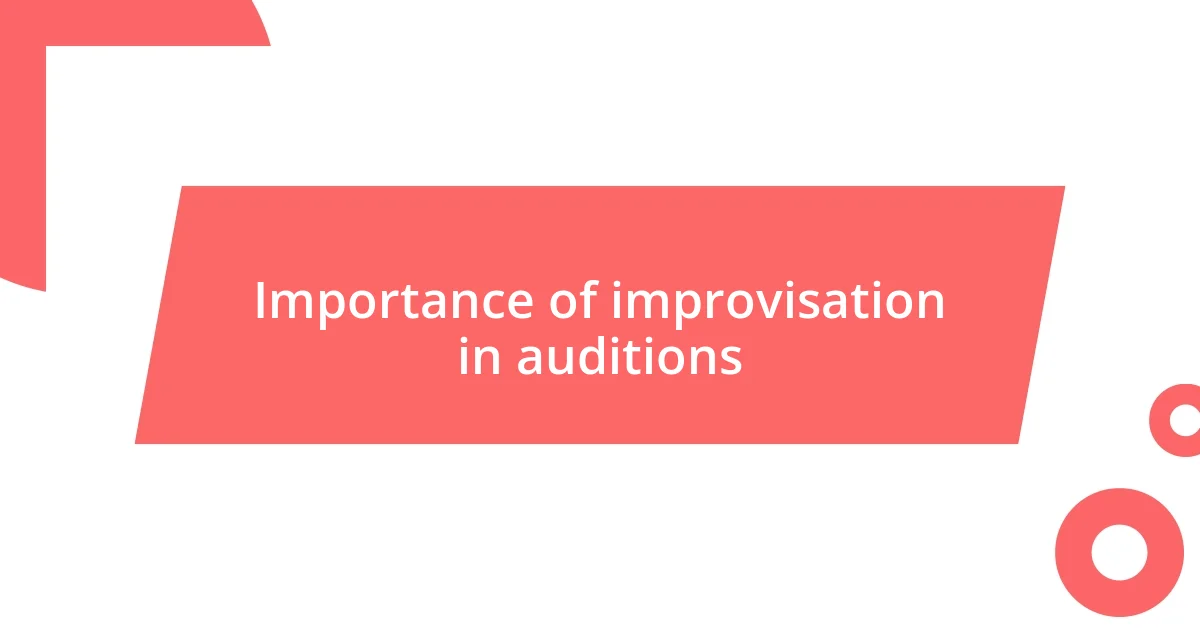
Importance of improvisation in auditions
Improvisation in auditions is crucial because it demonstrates not only your creativity but also your adaptability. I recall an audition where a sudden change in dialogue threw me off course. Rather than clinging to my original line, I took a breath, embraced the surprise, and responded in character, which highlighted my ability to stay grounded despite the chaos. This moment reminded me that casting directors are looking for actors who can navigate unexpected challenges with confidence and grace.
Here are some key reasons why improvisation is vital in auditions:
- Flexibility: Adapting to changes showcases your range as an actor.
- Authenticity: Improvisation helps in delivering a natural performance, as unexpected moments often feel more genuine.
- Engagement: It allows for a deeper connection with the audience, making characters more relatable.
- Confidence: Mastering improvisational skills builds self-assurance, essential for any performance.
- Collaboration: It fosters a sense of teamwork, especially when interacting with other performers or directors.
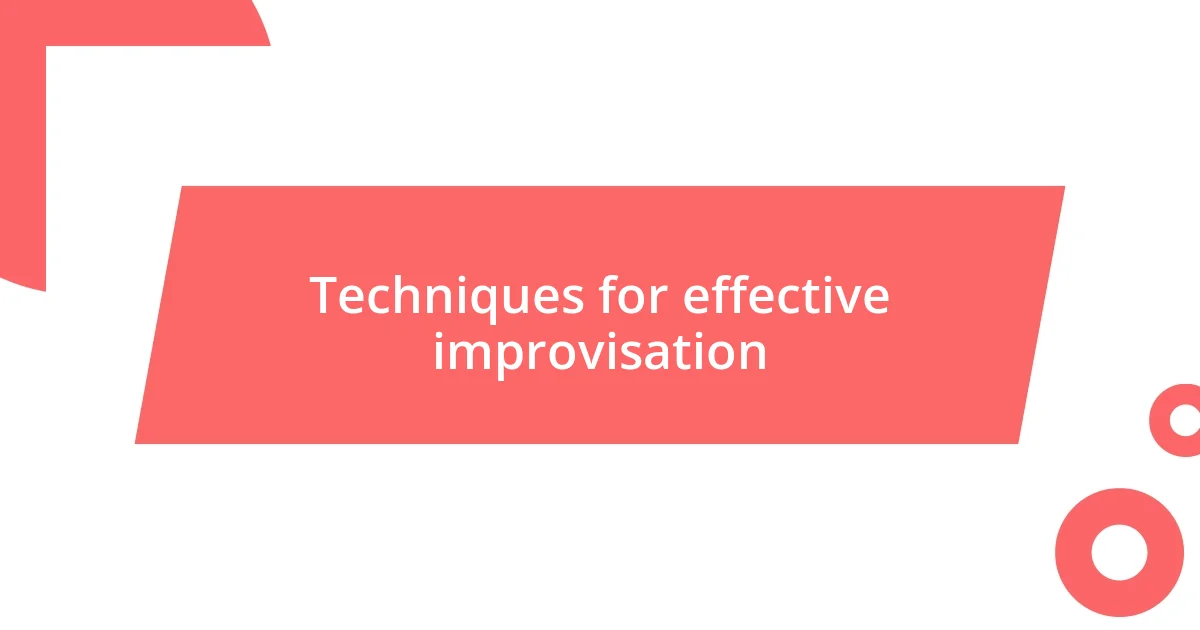
Techniques for effective improvisation
In my journey with improvisation, I’ve found that embracing the “Yes, and…” technique is incredibly powerful. This approach encourages you to accept what your scene partner presents and build upon it, fostering a collaborative atmosphere. I recall a moment when a fellow actor added an unexpected element to a scene. Instead of shutting it down, I responded with enthusiasm, which led to a vibrant exchange that both surprised and delighted us, ultimately transforming our performance.
Another technique that I’ve seen work wonders is visualization. Before stepping into an audition, I like to close my eyes and picture the character in various situations. This mental preparation allows me to access their emotions more deeply and instinctively react to any prompts given during the audition. I once visualized a tense confrontation and felt my heart race—a sensation that I was able to channel during the audition, making my reactions feel authentic and spontaneous.
Lastly, practicing mindfulness can be a game-changer. Staying present and aware helps prevent your mind from wandering, especially when faced with unexpected shifts in a scene. During auditions, I’ve noticed that grounding myself through deep breaths allows me to reconnect with my instincts and seize those fleeting magical moments. It’s about embracing uncertainty and making it your ally instead of your enemy.
| Technique | Description |
|---|---|
| Yes, and… | A collaborative approach that embraces what others bring into the scene and builds on it. |
| Visualization | Mental practice to access emotions by imagining the character in various scenarios. |
| Mindfulness | Staying present and aware to navigate unexpected moments with ease. |
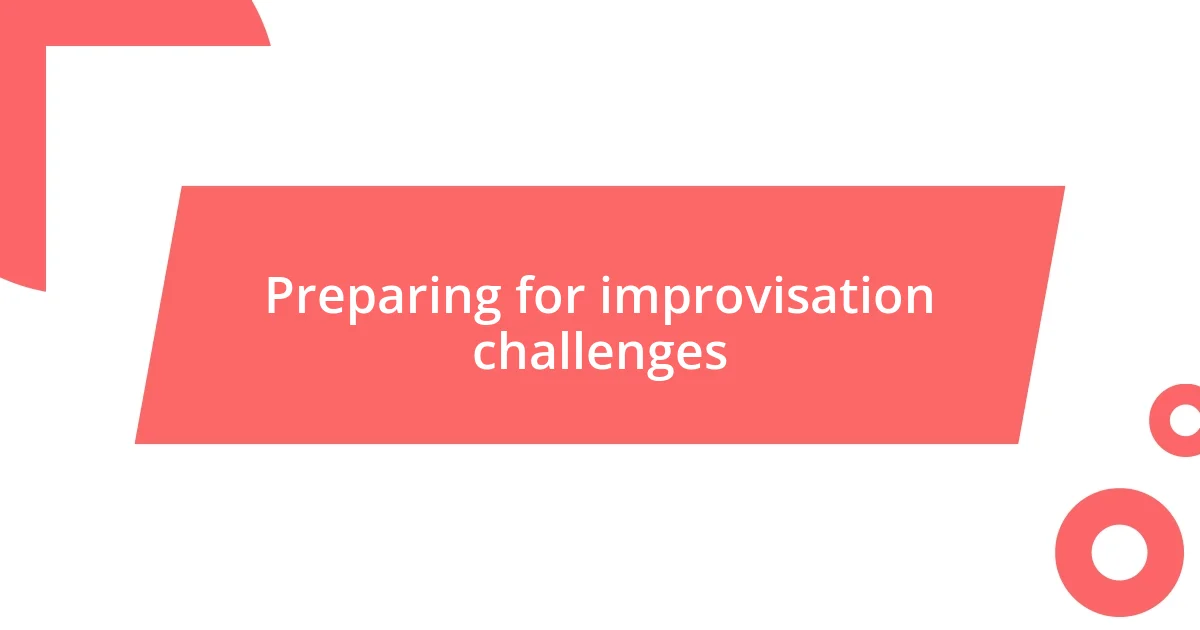
Preparing for improvisation challenges
Preparing for improvisation challenges is all about setting a strong mental foundation. I often remind myself to approach each audition with an open mind, ready to embrace whatever comes my way. Have you ever felt that initial rush of anxiety before an audition? I find that turning that nervous energy into excitement can transform the experience.
Practicing with other actors has been invaluable for me. I remember this one session where we decided to throw out the script completely and just react to each other’s cues. The spontaneity not only challenged me but also deepened my connection with my scene partners. It’s amazing how those moments of unpredictability can fuel your creativity. Preparing in such unstructured environments helps me navigate unpredictable auditions with more confidence.
I also emphasize the importance of visualization during my preparation. Before stepping into an audition room, I spend a few minutes imagining the scenarios I might encounter. Picture this: you’re at an audition, and suddenly, a prompt you didn’t expect comes up. It can feel overwhelming, but by visualizing different outcomes ahead of time, I give myself a mental toolbox to pull from. This practice has saved me more than once and allowed my instinct to take over when it matters most.
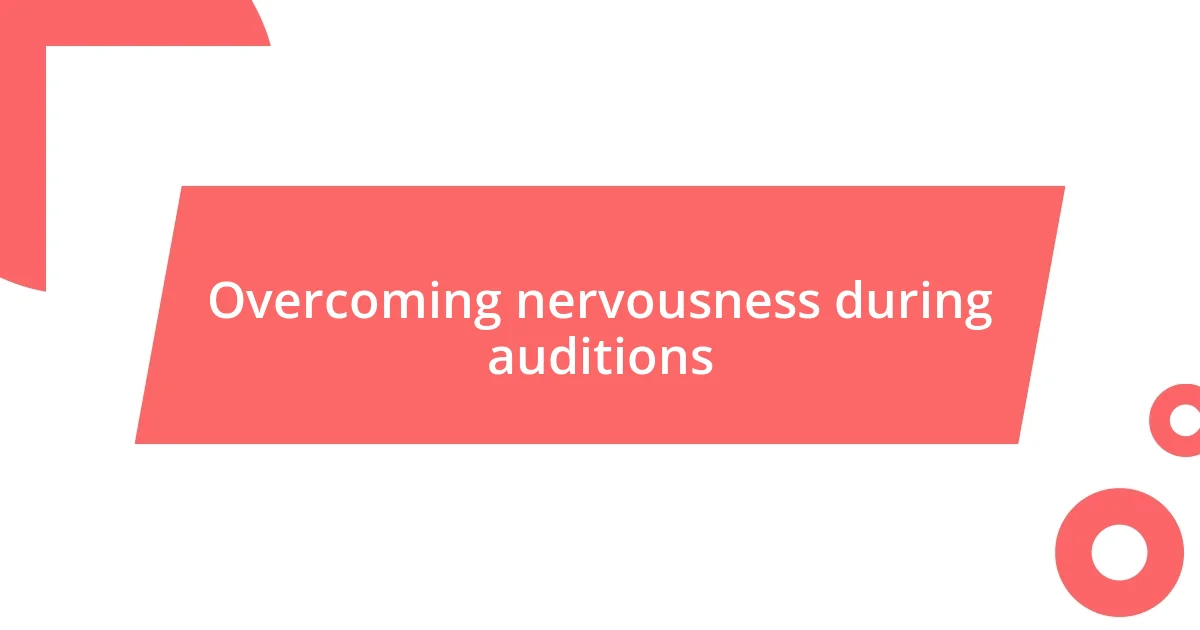
Overcoming nervousness during auditions
I remember standing outside the audition door, my hands sweaty and heart racing. In moments like these, I used to think, “What if I mess up?” But over time, I learned to pivot from fear to focus. I take a deep breath and remind myself that it’s just a room full of people who want to see something genuine. That mindset shift really eases the tension.
One strategy that has helped me tremendously is grounding myself in the moment. Just last week, before a particularly intimidating audition, I focused on the scent of my coffee and the sounds around me. This connected me to the here and now, allowing my nerves to settle. It’s fascinating how simply becoming aware of your environment can dissolve anxiety, isn’t it? It’s like finding a hidden oasis within the storm of emotions.
I also engage in a little self-talk before I enter. I can hear my own voice saying, “You are here because you’ve prepared. You’ve done the work!” This affirmation ignites a spark of determination within me. It turns out that reminding myself of my past successes does wonders for my confidence. When I walk into that audition room, I’m not just another nervous actor—I’m someone ready to share my creativity with the world.
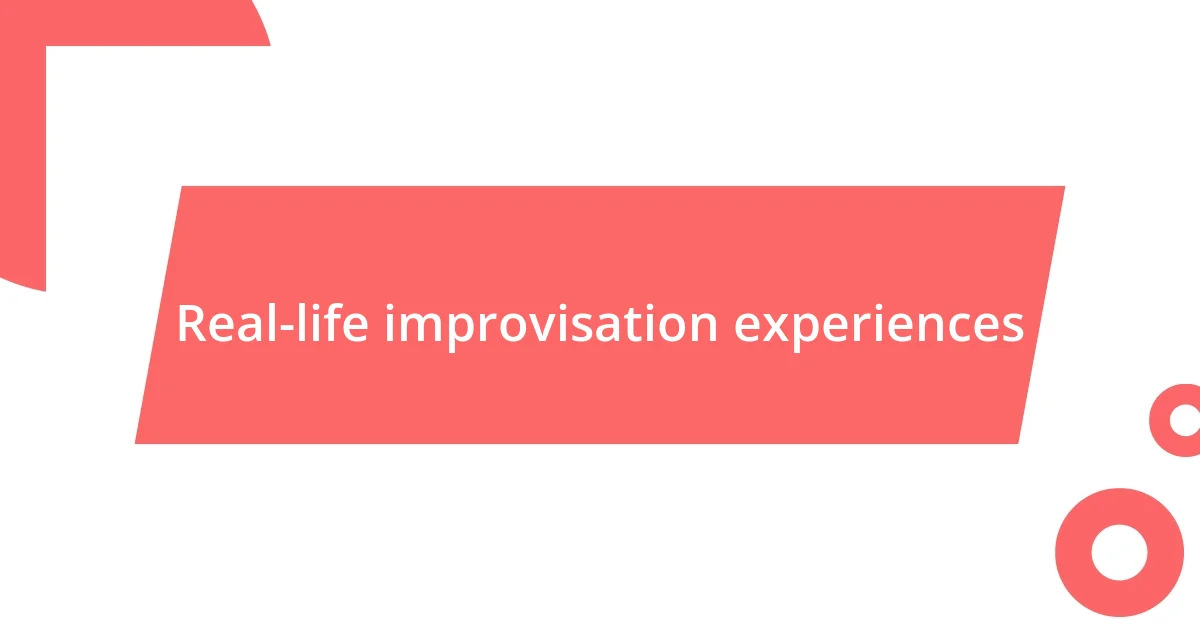
Real-life improvisation experiences
I recall this one audition where the director threw a curveball: instead of the prepared scene, we were given a random, out-of-the-blue prompt. The unexpected chill of shock almost froze me for a second. But I took a deep breath and leaned into it, drawing on my instinctive reactions. That little moment taught me that improvisation isn’t about perfection; it’s about authenticity and being present in the moment.
During another audition, I encountered a scenario where my scene partner unexpectedly reacted in a way I hadn’t anticipated. My instinct was to panic, but instead, I embraced the surprise. I responded from a place of honesty, truly engaging with their choice, and the scene blossomed into something beautiful. Have you ever felt that spark when you’re simply reacting rather than worrying about what’s next? It’s exhilarating to discover how improvisation can turn tension into a vibrant exchange of energy between actors.
I’ll never forget the time I tried out for a musical. Right in the middle of my solo, the accompanist misplayed a crucial chord. Instead of folding under pressure, I chuckled to myself and improvised a new melody on the spot. It wasn’t what I rehearsed, but in that moment, I felt so alive, weaving something unexpected into my performance. Isn’t it incredible how such moments can redefine our experience and reveal new dimensions of our creativity?



